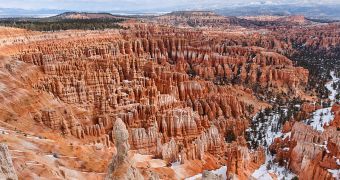Utah's Bryce Canyon National Park is an amazing reserve with a high conservation value. Unfortunately, every breath of fresh air could be tainted by the coal-exploiting operations developed by a newly-announced controversial project.
A coal mine occupying no less than 3,500 acres of land could be opened in the vicinity of the national park.
The Bureau of Land Management (BLM) is eager to experience the advantages provided by this new site, expected to offer more unsustainable energy to Los Angeles residents within the next years. There is little doubt regarding the harmful impact of such a decision, The Huffington Post reports.
BLM plans to divert the coal obtained at Alton to the Intermountain Power Plant. As a result, the mega power plant would offer enough traditional energy to meet up to 50% of the overall energy demand in Los Angeles.
Mining activities could considerably affect air and water quality in the region. Also, an extended coal digging process would be the main element responsible for destroying acres of biodiverse habitat and putting the lungs of visitors at great risks.
Toxic coal dust is expected to pollute the Bryce Canyon reserve, as the company behind this project would turn noiseless Utah into a powerful, dirty industrial city.
Environmental group representatives agree that such irresponsible changes can jeopardize tourism and the health of local community members.
This opinion is shared by thousands of Los Angeles residents, who want to determine City Council members to replace the power provided by coal-burning operations with risk-free, green alternatives offered by renewables by 2020, especially since the city has unlimited potential to harness solar energy.
If LA switches to energy-efficiency and alternative power, its people would have easier access to more green jobs and a highly sustainable future.
On the other hand, the feared coal mine project still awaits approval.
Unless conservationists manage to change the course of events and swat the authorities' position, a major site will affect the balance of the Bryce Canyon National Park – and it will no longer be known as the biodiverse habitat of “100 species of birds, dozens of mammals, and more than a thousand plant species.”

 14 DAY TRIAL //
14 DAY TRIAL //